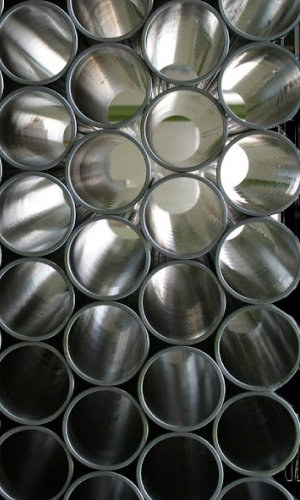The range of applications of steel pipes in the construction industry is very wide. Below please find some examples.

Calculate the weight of pipes
Load-bearing structures
Steel pipes are often used in the construction of structural frames for buildings and staircases. Thanks to their strength, steel pipes allow the construction of structures with large spans and relatively low weight.
Heating pipe systems
Steel pipes are often used in DH pipe systems that transport heat to buildings. Steel pipes are characterized by high strength and corrosion resistance, which is especially important in the case of installations exposed to high mechanical loads and external factors.
Water and sewage pipe systems
Steel pipes are also used in water and sewer pipe systems to transport water and sewage.
Interior design elements
Steel pipes can also be used for decorative interior design, e.g. as stair railings, balustrades, elements of furniture or lighting. Thanks to their simplicity and elegant appearance, steel pipes are a very versatile material that can be used in many different interior arrangements.
Ventilation systems
Steel pipes are also widely used in ventilation systems that transport air in and out of buildings. Thanks to their corrosion resistance and high strength, steel pipes allow the construction of high-efficiency and long-life ventilation systems.
Bridge structures
Steel pipes are also used in the construction of bridge structures, both as load-bearing elements and traffic restraint systems. Steel pipes allow the construction of high-strength bridges that can carry heavy loads.
Constructions of industrial halls
Steel pipes are often used in the construction of industrial halls, warehouses and other industrial buildings. These constructions are durable, resistant to vibrations and allow you to easily adapt the space to different needs.
Structural elements of industrial equipment
Steel pipes are also used in the construction of structural elements of industrial equipment, such as machines, machine tools or material handling structures. Thanks to their strength and resistance to corrosion, steel pipes allow the construction of devices that are able to work in difficult conditions.
Roof structures
Steel pipes can also be used to build roof structures, e.g. in industrial buildings, garages or warehouses. These constructions allow for easy adaptation of the roof to various needs, e.g. by using different angles of inclination or shapes.
Floor heating systems
Steel pipes can be used in underfloor heating systems that allow heat to be evenly distributed throughout the room. Steel pipes are characterized by high strength and resistance to high temperatures, which is especially important in the case of heating systems.
Rope constructions
Steel pipes are also used in the construction of rope structures, such as rope parks or cable cars. Steel pipes are durable and resistant to heavy loads, which allows the construction of safe, high-strength rope structures.
Offshore structures
Steel pipes are also used in the construction of offshore structures, i.e. objects located at sea, such as drilling platforms or wind farms. Steel pipes are characterized by high strength and resistance to weather conditions, which is especially important in the case of offshore structures.
Drainage systems
Steel pipes are also used in drainage systems that drain rainwater and snowmelt from the surfaces of buildings and adjacent areas. Steel pipes are characterized by high strength and resistance to corrosion, which is especially important in the case of drainage systems that are exposed to moisture and other external factors.